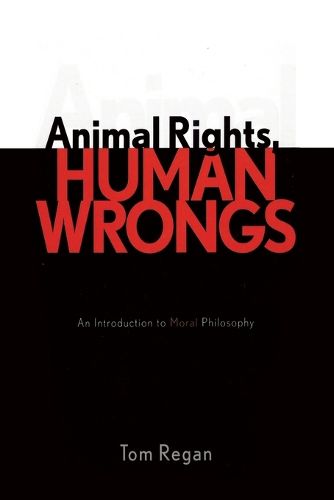Readings Newsletter
Become a Readings Member to make your shopping experience even easier.
Sign in or sign up for free!
You’re not far away from qualifying for FREE standard shipping within Australia
You’ve qualified for FREE standard shipping within Australia
The cart is loading…






What gives an animal rights? What makes product testing on animals wrong? In Animal Rights, Human Wrongs prominent activist and philosopher Tom Regan skillfully puts forth the argument for animal rights through the exploration of two questions central to moral theory: What makes an act right? What makes an act wrong? Taking into consideration moral theories such as contractarianism, utilitarianism, and Kantian ethics, Regan provides the theoretical framework that grounds a responsible pro-animal rights perspective, and ultimately explores how asking moral questions about other animals can lead to a better understanding of ourselves. The necessity of making a transition from moral theory to moral practice becomes startlingly clear as Reagan examines the commonplace, everyday choices that would be affected by believing in a moral theory that affirms the rights of animals. For the many people who have ever wondered what difference does it make if animals have rights, Animal Rights, Humans Wrongs provides a provocative and intriguing answer. For a discussion of animal rights tailored to a more general audience, see Empty Cages: Facing the Challenge of Animal Rights (Rowman & Littlefield, 2003).
$9.00 standard shipping within Australia
FREE standard shipping within Australia for orders over $100.00
Express & International shipping calculated at checkout
Stock availability can be subject to change without notice. We recommend calling the shop or contacting our online team to check availability of low stock items. Please see our Shopping Online page for more details.
What gives an animal rights? What makes product testing on animals wrong? In Animal Rights, Human Wrongs prominent activist and philosopher Tom Regan skillfully puts forth the argument for animal rights through the exploration of two questions central to moral theory: What makes an act right? What makes an act wrong? Taking into consideration moral theories such as contractarianism, utilitarianism, and Kantian ethics, Regan provides the theoretical framework that grounds a responsible pro-animal rights perspective, and ultimately explores how asking moral questions about other animals can lead to a better understanding of ourselves. The necessity of making a transition from moral theory to moral practice becomes startlingly clear as Reagan examines the commonplace, everyday choices that would be affected by believing in a moral theory that affirms the rights of animals. For the many people who have ever wondered what difference does it make if animals have rights, Animal Rights, Humans Wrongs provides a provocative and intriguing answer. For a discussion of animal rights tailored to a more general audience, see Empty Cages: Facing the Challenge of Animal Rights (Rowman & Littlefield, 2003).